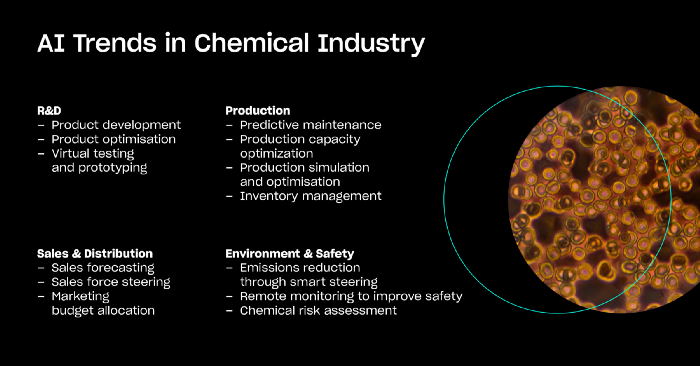Revolutionizing the Discovery of New Chemicals: The Transformative Role of Artificial Intelligence
Introduction
Artificial Intelligence (AI) has revolutionized numerous industries, and the field of chemistry is no exception. With its ability to process vast amounts of data, recognize patterns, and generate insights, AI is transforming the way scientists discover new chemicals. This article explores the impact of AI on chemical discovery, highlighting its benefits, challenges, and potential future developments.
The Role of AI in Chemical Discovery
Chemical discovery has traditionally relied on time-consuming and labor-intensive experimental methods. However, AI is revolutionizing this process by augmenting human capabilities and accelerating the discovery of new chemicals. By leveraging AI algorithms and machine learning techniques, scientists can analyze vast chemical datasets, simulate molecular structures, and predict properties with remarkable accuracy.

Enhancing Efficiency with Machine Learning
Machine learning algorithms play a pivotal role in the advancement of chemical discovery. They can be trained to recognize patterns in large chemical databases, identify relationships between molecular structures and properties, and generate predictive models. These models enable researchers to streamline the identification of promising candidates for drug development, materials science, and other chemical applications.
Predicting Molecular Properties
One of the significant advantages of AI in chemical discovery is its ability to predict molecular properties. By analyzing the structures and compositions of various compounds, AI algorithms can estimate properties such as toxicity, solubility, stability, and biological activity. This predictive capability enables scientists to prioritize and focus their efforts on the most promising chemical candidates, saving both time and resources.
AI Techniques in Chemical Discovery
AI encompasses various techniques that have been instrumental in advancing chemical discovery. Let’s explore some of these techniques and their applications:
1. Machine Learning Algorithms
Machine learning algorithms, such as support vector machines (SVM), random forests, and neural networks, have found extensive use in chemical discovery. These algorithms can analyze large datasets, learn from patterns, and make predictions about the properties and behavior of chemical compounds.
2. Generative Models
Generative models, including generative adversarial networks (GANs) and variational autoencoders (VAEs), have the potential to revolutionize chemical discovery. These models can generate novel molecular structures with desired properties, helping scientists explore new chemical space and uncover previously unknown compounds.
3. Natural Language Processing (NLP)
NLP techniques have proven valuable in extracting and analyzing chemical information from scientific literature and patents. By using NLP, researchers can gather vast amounts of knowledge, identify trends, and gain insights that can inform their chemical discovery efforts.
4. High-Throughput Screening
High-throughput screening involves the automated testing of thousands or even millions of chemical compounds to identify those with desired properties. AI-driven automation and robotics enable scientists to perform these experiments efficiently, accelerating the discovery of new chemicals.
5. Quantum Chemistry Simulations
Quantum chemistry simulations, combined with AI techniques, enable scientists to model and predict the behavior of chemical compounds at the atomic and molecular levels. These simulations provide valuable insights into the properties and interactions of compounds, aiding in the discovery of new chemicals with tailored characteristics.
Benefits of AI in Chemical Discovery
The integration of AI into chemical discovery processes offers several notable benefits:
1. Accelerated Discovery Timelines
By leveraging AI’s processing power and predictive capabilities, researchers can significantly shorten the time required to discover new chemicals. AI algorithms can quickly analyze vast amounts of data, identify potential candidates, and guide experimental efforts, leading to faster discoveries.
2. Cost Savings
AI-driven chemical discovery can help reduce costs associated with experimental testing. By using predictive models and simulations, scientists can prioritize their experiments, focusing on compounds with a higher likelihood of success. This targeted approach minimizes resources wasted on less promising candidates, resulting in cost savings









